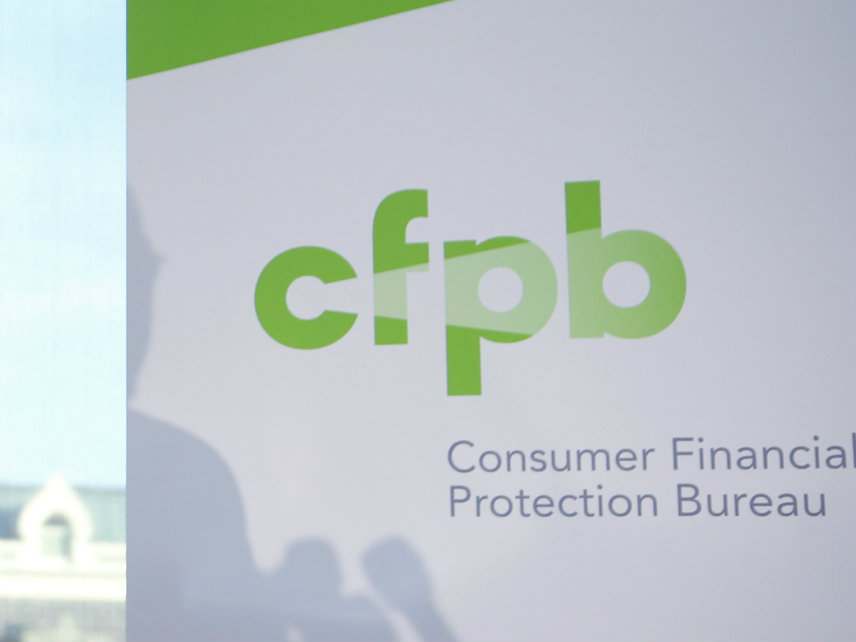The CFPB Is Too Powerful, Says Head of CFPB
Mick Mulvaney is a rarity: an executive branch official who pleads with Congress to take away his power. The rest of us should listen.

The Consumer Financial Protection Bureau is too powerful and lacks meaningful oversight, says Mick Mulvaney, the acting director of—yes—the Consumer Financial Protection Bureau.
It's not often that an official calls for a reduction in his own office's powers, but that's what Mulvaney has done in a semi-annual report to Congress about the bureau's activities. Since taking over as the head of the CFPB in November, Mulvaney has limited the agency's activities. But he says Congress should address a fundamental mistake it made when creating the CFPB as part of the Dodd-Frank Act in 2011.
"By structuring the Bureau the way it has, Congress established an agency primed to ignore due process and abandon the rule of law in favor of bureaucratic fiat and administrative absolutism," Mulvaney writes.
The report, submitted to Congress on Monday, details CFPB actions from April through September 2017, when Obama appointee Richard Cordray was running the agency. Aside from periodically having to report to Congress, the CFPB has little oversight from other branches of government, an arrangement that was meant to insulate the bureau from political influence but has instead turned it into a omnipotent regulator. Congress does not even have budgetary authority over the bureau, which is funded directly from the Federal Reserve.
Mulvaney says the agency's problems are structural: Under the Dodd-Frank Act, the CFPB director is empowered to serve as all three branches of government.
"The bureau's director simultaneously serves in three roles: as a one-man legislature empowered to write rules to bind parties in new ways; as an executive officer subject to limited control by the President; and as an appellate judge presiding over the Bureau's in-house court-like adjudications," Mulvaney writes.
That echoes the conclusion of Brett Kavanaugh, a federal judge who ruled in 2016 that the CFPB's single-director structure was unconstitutional. "Other than the President, the Director of the CFPB is the single most powerful official in the entire United States Government, at least when measured in terms of unilateral power," Kavanaugh concluded. That ruling was later overturned by the full D.C. Circuit Court of Appeals, and it could be on its way to the U.S. Supreme Court.
Mulvaney, a member of the House before President Donald Trump appointed him director of the White House Office of Budget and Management (a role which he continues to hold while running the CFPB), wants his former colleagues to fix the CFPB's problems before the Supreme Court gets involved.
Specifically, Mulvaney writes that Congress should amend Dodd-Frank to require congressional appropriations for the bureau's budget, require congressional approval of any major rules created by the bureau, and require that the director answer to the president on matters of executive authority. The latter proposal would prevent a repeat of the crisis triggered last year when Cordray stepped down and tried to appoint his own successor rather than allowing Trump to name a new director. Mulvaney also recommends creating an independent inspector-general for the agency, which currently lacks even that basic accountability function.
Sen. Elizabeth Warren (D-Mass.), who championed the CFPB's creation before she was a member of Congress, favors an unaccountable CFPB director who can exercise federal authority without any pesky concerns about separation of powers or congressional oversight. She presumably thought the right people would be running the bureau. With the rise of Trump, perhaps even ardent CFPB supporters will find a reason to favor restraints on its power.
No one will always agree with the people who run government agencies. The only long-term solution to that problem is to stop handing over so much power to unelected—and in the case of the CFPB, unaccounable—executive branch officials. And if Mulvaney is going to be the rare executive branch official who pleads with Congress to take away his power, that just might be a sign we should listen.


Show Comments (11)